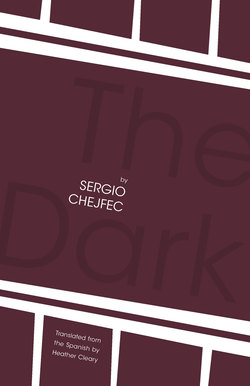The Dark

Реклама. ООО «ЛитРес», ИНН: 7719571260.
Оглавление
Sergio Chejfec. The Dark
Отрывок из книги
Other Works by
Sergio Chejfec
.....
I had been mistaken about the phrase “pick up some clothes,” the same way I had been about what I’d wanted to see and not to see when I discovered where Delia caught the bus. “Picking up some clothes” meant, to me, “picking up some clothes I lent someone.” This was evidently a specific reading, not exactly wrong, but incorrect. It was also less straightforward than the one I had not wanted to imagine, but which was true all the same: that Delia needed to borrow clothes because there were times when she had nothing else to wear. I discovered this a few days later, under sad circumstances, when she had to return what she’d borrowed. We were walking along a dirt road. It had rained the day before, and as the earth dried out, the steam that rose from the puddles smelled of mud, a scent that called to mind roots, leaves, fruit, and animals or insects, all mixed together. The smell was strong, unmistakable; it felt like being within centimeters of the ground, to that height just above the surface where the particles float at the mercy of the air, the weather, and the movements of the earth, which lift them and then let them fall again, forming a crust in a state of permanent suspension, a halo of proximate gravity. Anyway: we were walking along, upright, as saturated with the humid scent of the mud as if we had been close enough to taste it, when Delia suddenly said, “I hope a car doesn’t splash me, I have to return this skirt tomorrow.” The skirt was dark, blue or black, depending on the light. I had been reflecting on the skirt all along, since I noticed that it made Delia’s hips, so attractive in their innocence and the harmony of their shape, more attractive still. As she walked, her legs seemed to be holding up a mystery, a bud waiting for the right moment to burst open and unfurl. What I mean is that the skirt seemed to have been made for Delia, that its essence or meaning was only fully realized when, as is always said of the primary function of attire, it shielded her from the elements. But this impression crumbled as soon as I heard her remark. It took me a while to understand that such loans could belong to an order as natural as any other—possession, for example; the idea that the skirt had been made especially for Delia was no less true because she could only wear it when it had been lent to her. This gave the loan a new significance: it was the alias fate had chosen to reveal a truth, in this case one that involved Delia, which otherwise would have remained hidden.
That afternoon, I also discovered that the concept of a loan might encompass different, even contradictory, meanings. A loan, a debt. I’ve read several novels that try to determine the meaning of these words. I don’t know if they succeed; in any event, none present a model of loans or debt that resembled the way Delia seemed to see them. Delia believed that a loan could never be repaid in full, that the loan itself brought about a decisive change in the general course of events, and therefore that the idea that giving something back was a repayment, compensation, or a return to normal was misguided and incomplete. She believed that the loan remained active over time, even after it was paid back. This was because the object, in this case a skirt, retained traces of its various owners, or rather, of the various people who had used it over time. These marks, which made the objects unique and unmistakable, were invisible to the average person yet were indelible in the eyes of the community. With each new loan, the collective appreciation of the object—here, the skirt—grew. The article of clothing itself could deteriorate with use and circulation, but this damage was mitigated by the greater care everyone would take of it. As such, time limits were rarely imposed on these loans. Not because there was no pressure to return the item, but because, since the object was marked by each custody, the debt was reproduced in the memory of the community. That was debt, according to Delia: a repayment that was both unnecessary and always deferred. It was clearly a definition far removed from material concerns, at least, as these are generally understood. And this in spite of the fact that she lived, as perhaps I’ll describe later, with the daily reminders of that other, broader type of loan, the kind geared toward profit. It’s true that even before that moment, it had been obvious that the skirt could not have belonged to Delia; still, my surprise when I discovered it wasn’t hers was an effect of that part of the obvious we don’t want to acknowledge. The obvious side of things seems innocent, insubstantial, there for the sole purpose of holding up the hidden face of what is not obvious. And yet, the world organizes itself according to what is revealed. In this way, Delia’s comment about the loan added a measure of truth to what was already evident, and the weight of this reality became more pronounced.
.....